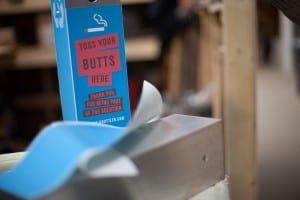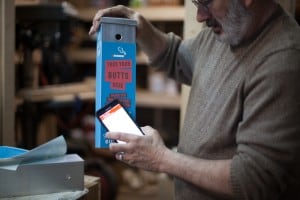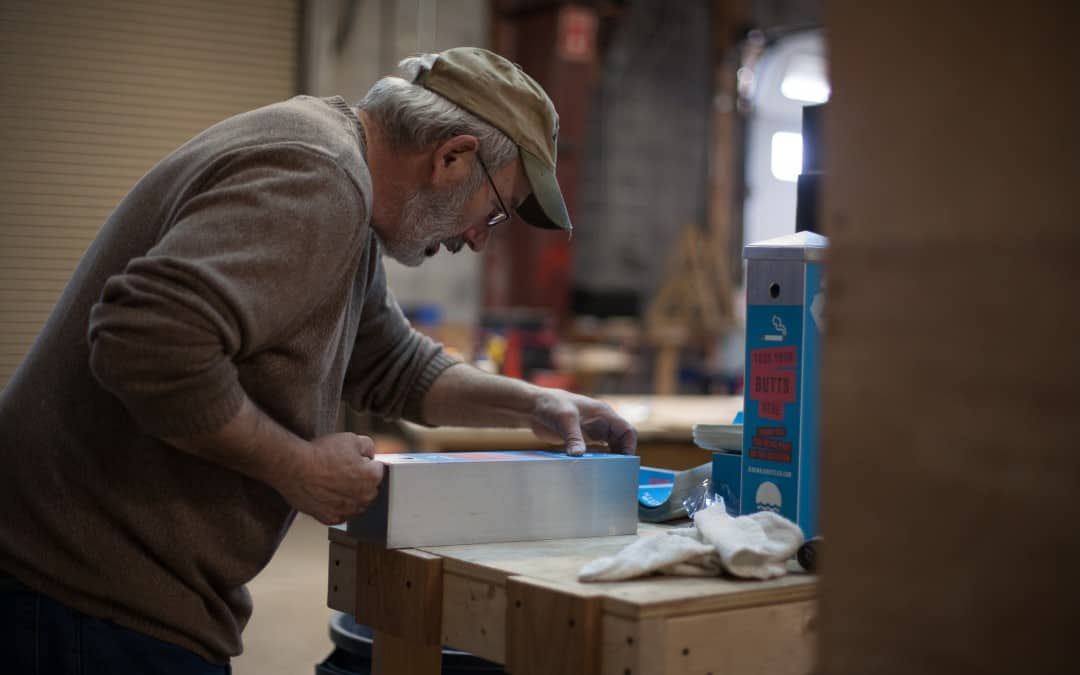Our Open Bench Project members come from all walks of life, whether an entrepreneur or a hobbyist, no matter where your journey is taking you, there’s a place for you here.
Check out OBP member Mike Roylos’ story.
Mike Roylos used to own Spartan Grill in downtown Portland, but sold the business to work full time on his civic startup Urbancare. Their first product is the Sidewalk Buttler, a low maintenance cigarette butt disposal system. Mike took a Buttler prototype to the National Day of Civic Hacking event in Portland in 2014, and currently provides Buttlers to cities and towns in Maine as well as institutions like hospitals. Urbancare continues to work on new Buttler prototypes and hopes to scale to cover New England and eventually gain nationwide adoption.

How did you come up with the idea for the Sidewalk Buttler?
Well I got notice at my business from the city about sweeping the butts from the front of our shop. We knew there are a lot of people who come by to pick through our recycling for returnables, so we decided to do a bounty program for the butts and get people to pick them up for us. In 2 days we picked up 26,000 cigarette butts.
When did you first know it was going to “work”?
After taking a prototype to the 1st Maine Civic Hackathon, we decided to try placing one outside Geno’s Rock Club, and sure enough people used it. By later expanding the proof of concept to 15 units,we ended up disposing of thousands of butts and got tons of media coverage for that and joined forces with the Natural Resources Council of Maine to promote the concept.
What challenges did you / do you face in getting your idea adopted by cities?
Well we had to somehow get them interested in it without having any grants available. Cigarette butt litter isn’t on the city’s radar, and funding is very tight for additional programs. We had to develop methods to bring attention to it, then pay for and implement the idea. Some places fall in love with the idea right away. Neighborhood groups love them. They’re the frontline troops who really see the problem, but in order to get adoption we need acknowledgement from public works and the city that there’s an issue. It takes time to put a micro-project through city hall. In Portland, we had lots of meetings with the mayor, town manager, public works and other people, and they were helpful and eventually let us do a pilot project. So we launched the pilot and provided 100 units to the city for and now they’re very successful. In 2015, we collected over 400,000 butts off the streets and ultimately kept them out of Casco Bay.
There was another issue with who does the collection and how to maintain them. NRCM negotiated with public works to get people from workfare to do collection and we made sure the system was clean and easy to use for them. On Peaks Island a volunteer group does collection, and in Biddeford another group; that’s something we have to figure out in every place, but ideally we are making jobs for people with it.
How far do you plan to scale your idea? What’s holding you back?
We’re hoping to cover the northeast and then the rest of the country –there’s butts everywhere– but it’s beneficial having Portland as a proving ground because it makes the product better.We adapt and improve the model real time on the streets here. You have to be ready to scale, and we’re on our 7th model of the Buttler. As we get bigger and put them in different environments, the product changes. The first one was steel, then PVC, but to move em outside of Portland they needed to be more substantial so now we’re using aluminum. It’s a process of evolution. Right now you’re able to get them emptied in less than 7 seconds, touch free; they look nice, and blend into any environment. We have developed tracking software to accurately quantify not only the number of butts picked up, but a time & date stamp as to when they are serviced,and the number of views the sponsors messaging receives. This allows us to report on the sponsor’s website how well their investment in cleaner streets are doing and gives bragging rights on the results.
Perception about public health can also be an issue sometimes; we have proved we are solving an environmental problem and not somehow promoting smoking.
How can cities and civic tech groups help entrepreneurs like you better?
It would be nice if there was a single contact to talk to about pitching a solution, and a mentor involved with the city or somewhere to go to get guidance. I feel like I’m reinventing the wheel every time I go somewhere because I never know who to talk to. We chased our tails for months just trying to get in front of the right people. If I wasn’t so stubborn I might have said screw it and started a brewery or something more sexy. Making the idea work isn’t the hard part, it’s been proven over 400,000 times last year but adoption is a challenge, that’s what takes takes so long.

How to use RFID tech to check the Buttler.
Interview by Nick Kaufmann. If you want to learn more about the Sidewalk Buttler, you can check out their website at sidewalkbuttler.com or email mi**@*************er.com.
And then some,
Your Friends @ OBP


Recent Comments